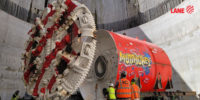Crews are nearly done constructing the launching and receiving pits at each end of the tunnels. The pits vary in length from 375 ft to 400 ft, and from 97 ft to 110 ft in width. Pit depths range from 28 ft to 34 ft.
The pits' ramps will provide a foundation for the tunnels' approaches and exits. Ramps and tunnels will progress at a constant 5% grade, a steep slope necessary due to the tunnel's short length, Nunez says. “The geometry is challenging, because you are constantly on a slope up and down, and you have curves,” he adds.
The design takes buoyancy into account. “You need a certain amount of overburden on top of the tunnel, so it does not tend to float,” says Wilson.
Boring and reassembly
Boring will proceed eastbound from Watson Island, along MacArthur Causeway, to Dodge Island, where the port is located. Once the first tunnel is bored, the TBM will be partially disassembled and then reassembled and sent back to Watson Island.
The tunnels will follow the same alignment, adjacent to each other. The spacing between the two will vary from 11 ft at the portals to 47 ft at the widest spacing point. Five cross-passages, for emergency egress and maintenance, will connect the tubes.
A conveyor system just behind the TBM will automatically place curved, precast concrete segments to form the circular tunnel walls. A complete, circular section of the tunnel is composed of eight, 12-ton precast concrete segments—each 14.5 ft long, more than 5.5 ft wide and 2 ft thick—that are placed end to end. Together, the tunnels will include approximately 12,000 precast concrete segments.
“(Precasting) was the only way to do it,” Wilson says, adding that Bouygues Civil Works Florida is precasting the segments at a plant about 10 miles from the port. “Since it's a circular tunnel, it would have been very difficult to form that and pour it, and you would never have gotten the quality control you get at a plant.”
Design-build costs are estimated at $607 million. The state will pay half of the capital costs and fund operations and maintenance, while Miami-Dade and the City of Miami will pick up the rest of the capital costs.
VMS, a division of Transfield Services North America, Richmond, Va., will operate and maintain the tunnel. Transfield documents indicate that its 31-year contract is valued at $260 million, which will be paid by the state. On Oct. 15, 2044, overall responsibility for the tunnel and roadway returns to FDOT.




Post a comment to this article
Report Abusive Comment